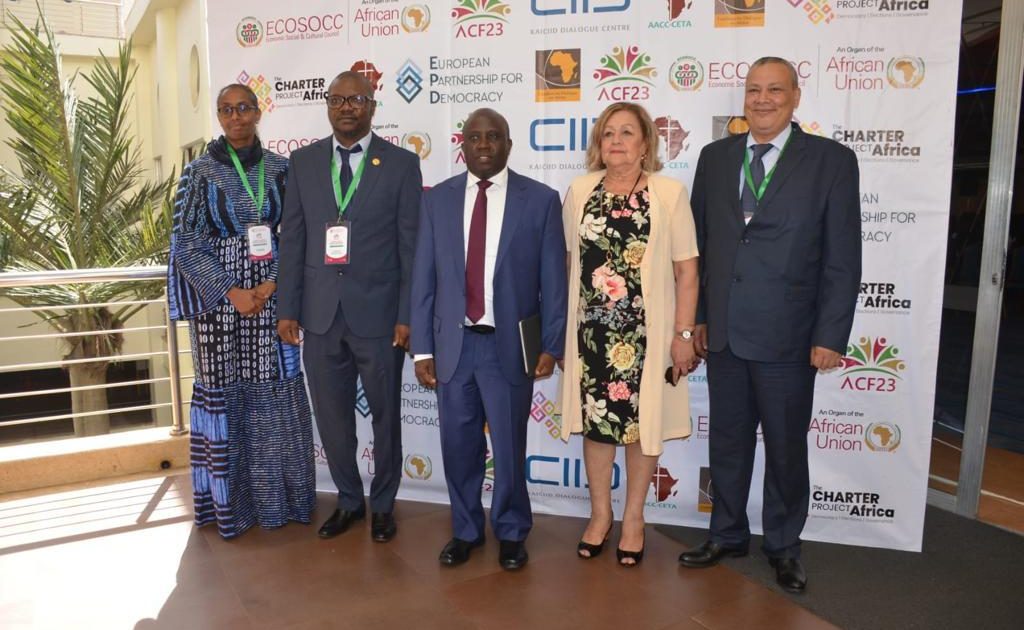Maximising digital technology has been proffered as a key factor in achieving Africa’s Agenda 2063 goals.
This was one of the conversations during the 2nd Annual Citizens Forum held in Kenya by the Economic Social and Cultural Council (ECOSOCC).
The forum bordered on issues of democracy and digital governance in the African continent.
Speaking at the occasion, Engineer John Tanui, Principal Secretary (PS) of the State Department for Information, Communications and Technology (ICT) and the Digital Economy, said that in a time when technological advancements are the driving force, Africa must harness the power of digital technologies to achieve its goals as outlined in Agenda 2063 and other continental aspirations.
According to Eng. Tanui, “Democracy, with its principles of inclusivity, transparency, and accountability, provides the foundation for good governance by embracing digital technologies upon which governments in Africa can enhance their efficiency, responsiveness, and service delivery to citizens.”
He noted that effective public participation in the decision-making processes that affect their lives can be encouraged via digital governance.
He continued by saying that inclusivity promotes trust, enhances democracy, and guarantees that all of Africa’s different perspectives are heard.
Read also: WTO Charges African Nations to Adopt Digital Technology for Trade
Tanui claimed that by utilising digital technologies, African countries may improve the delivery of public services, expedite administrative procedures, and foster conditions for long-term, sustainable economic growth.
He explained that in Kenya, they have started the process of digitising all government services and creating a central location from which users may access them online via the e-citizen site. Over 5000 services can currently be accessible online, he added.
Tanui indicated that in order to defend crucial infrastructure and safeguard the personal data of residents, it is crucial for African countries to set up strong cybersecurity frameworks, build local knowledge, and work with international partners.
The PS highlighted the Malabo Convention on Cybersecurity and Personal Data Protection of the African Union as one such framework, which according to him, Kenya is moving to ratify.
“Digital governance and the utilization of emerging technologies also contribute to political stability and regional development. By promoting transparency and accountability, digital systems reduce corruption and enhance trust in government institutions. This, in turn, fosters political stability and creates an environment that attracts foreign investments,” he instantiated.
Tanui noted the enormous potential for African growth held by cutting-edge technology like robots and artificial intelligence (AI).
According to the PS, robotics can revolutionize industries and open up new opportunities for economic growth while AI can be used in a variety of industries, such as healthcare, agriculture, and finance, to spur innovation and enhance service delivery.
“Africa should actively invest in research and development in these fields, foster collaboration between academia and industry, and build a workforce equipped with the necessary skills to harness the potential of emerging technologies,” he said.
ECOSOCC Head of Secretariat, Mr William Carew, further stated that although good governance and democracy have long dominated discussions worldwide, the innovation of this endeavor resides in introducing technology to the conversation.
He explained that the political landscape of the African continent is being shaped by democracy and digital governance, providing fresh chances for citizen participation, transparency, and accountability.
According to the HoS, “in today’s world, digital technologies offer unprecedented opportunities and challenges. They have the potential for positive transformation, but when improperly used, they can fuel divisions within and between countries, increase insecurity, undermine human rights and exacerbate inequality.”
Speaking further, Carew said there are continual attempts to enhance democracy in Africa, and the African Union (AU) is crucial in supporting democratic government, advancing human rights, and addressing governance issues.
“When the African Charter on Democracy, Elections and Governance (ACDEG) was adopted in 2007, it was a progressive legal document that identified and addressed some of the continent’s main governance challenges such as civil participation, inclusion and representation of women and minority groups, free and fair elections, and unconstitutional changes of government,” Carew revealed.
He recalled that just 5% of people in Africa had access to the internet at that time, and mobile phone penetration was also relatively low, but the case is different now.
“One of the significant challenges posed by digital technologies is the rapid spread of disinformation and misinformation. Social media platforms and online news outlets have become breeding grounds for the dissemination of false information, propaganda, conspiracy theories, cyber-attacks, hacking and data breaches (even the AU was recently hacked),” he said.
He, therefore, announced that the event had been renamed the ECOSOCC Annual Citizens Forum and will now be held annually on the sidelines of the Mid-Year Coordination Meeting with a modern topic in response to public demand.
